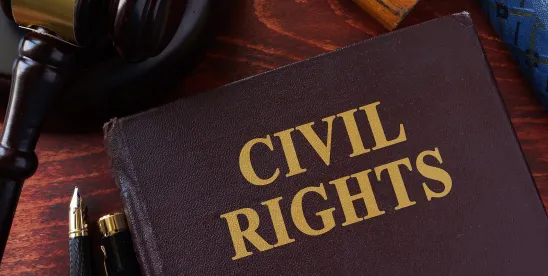On May 19, 2025, the U.S. Department of Justice (“DOJ”) announced the “Civil Rights Fraud Initiative” to broaden federal enforcement of federal civil rights laws through the use of the False Claims Act. This initiative has implications for universities, government contractors, and other recipients of federal funds, and may expose them to increased liability for civil rights violations alleged by private citizens.
The initiative’s stated goal is to investigate and, as appropriate, pursue claims against federal funding recipients who knowingly violate federal civil rights laws – including Title VI and Title IX - through the use of the False Claims Act. The DOJ’s May 19, 2025 memo specifically highlights federal enforcement concerns related to DEI programs, antisemitism, and transgender inclusion on college campuses, explaining the DOJ’s view that “a university that accepts federal funds could violate the False Claims Act when it encourages antisemitism, refuses to protect Jewish students, allows men to intrude into women’s bathrooms, or requires women to compete against men in athletic competitions” and that “schools continue to adhere to racist policies and preferences – albeit camouflaged with cosmetic changes that disguise their discriminatory nature.” These enforcement objectives appear to relate to the administration’s previously stated interpretations of federal civil rights laws with regard to of race-based preferences, certain DEI programming, and sports participation.
Many institutions of higher education receive federal funds through Title IV federal financial aid programs and federal research grants and contracts. As a condition of receiving those moneys, institutions of higher education are required to certify their compliance with federal civil rights laws. The initiative’s use of the False Claims Act as an enforcement mechanism heightens the possibility of that these certifications will be used to demonstrate that the institutions of higher education have made “knowingly false” claims to the federal government about their civil rights compliance in order to receive federal funds. Further, the False Claims Act permits whistleblower actions initiated by private citizens against organizations that have allegedly defrauded the government, heightening the possibility that third parties with no relationship with institutions may seek to bring whistleblower claims.
The impact of False Claims Act allegations can be wide-ranging. At a minimum, institutions who receive a civil investigative demand (CID) under the False Claims Act should be prepared to preserve and produce documents in response to large document requests, and present witnesses for interrogatories and testimony. Institutions who are found to have violated the False Claims Act could be liable to the federal government for treble damages and civil penalties, as well as to whistleblowers for litigation costs and attorney’s fees.
The Civil Rights Fraud Initiative is co-led by attorneys from the DOJ’s Civil Division Fraud Section and attorneys from the DOJ’s Civil Rights Division, as well as an Assistant United States Attorney from each of the 94 federal districts. The initiative will also work closely with the DOJ’s Civil Division and other relevant federal agencies, such as the U.S. Department of Education and the U.S. Department of Health and Human Services. These agencies may work together to investigate alleged civil rights violations prior to pursuing a Federal Claims Act matter, and institutions should expect that investigations may be both quick and broad, and be followed by demands for settlement and/or a lawsuit.
How Institutions Can Prepare
Institutions of higher education should think about how they will respond if faced with False Claims Act allegations related to their DEI programs, approach to student protests and antisemitism, and transgender issues , as outlined in the DOJ’s May 19, 2025 memo. Institutions should also consider conducting attorney-client privileged audits of programs and policies on their campuses to ensure compliance with federal and state civil right laws and to seek legal advice and counsel on best practices. Finally, institutions should review their whistleblower policies and confidential reporting protocols to ensure that internal whistleblowers – faculty, staff, students – understand how to confidentially report their concerns to the university, and how the university staff who receive those whistleblower reports respond consistent with university campus and/or Board policy. Institutions that are the subject of False Claims Act allegations should consult with legal counsel before responding.
Institutions should also be aware of developments in the certification requirements that the federal government imposes as a condition of receiving federal funding, and how courts have assessed the administration’s interpretations of federal civil rights laws to date. Certifications may be presented at the time that a university program or researcher is granted federal funding. As noted in our May 2, 2025 client alert, the certification language requested by the Department of Education for K-12 public school districts and states has been enjoined, and there may be additional legal challenges to proposed certification language, including in the higher ed context. Institutional leaders should have an ongoing awareness of what programs their institution is conducting, and whether those programs comply with any required federal civil rights certification language.







 />i
/>i

